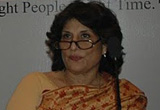 There’s good news finally. India’s new government announced in its budget speech, presented by finance minister Arun Jaitley on July 10 2014, that: “A national programme in mission mode is urgently required to halt the deteriorating malnutrition situation in India, as present interventions are not adequate. A comprehensive strategy including detailed methodology, costing, time lines, and monitorable targets will be put in place within six months.” The ruling party’s election manifesto had indeed stated earlier that “extreme poverty and malnutrition will be treated as a national priority and will be addressed on mission mode.” There was a bit of a wait to see the promise converted into intent, but so it was.
There’s good news finally. India’s new government announced in its budget speech, presented by finance minister Arun Jaitley on July 10 2014, that: “A national programme in mission mode is urgently required to halt the deteriorating malnutrition situation in India, as present interventions are not adequate. A comprehensive strategy including detailed methodology, costing, time lines, and monitorable targets will be put in place within six months.” The ruling party’s election manifesto had indeed stated earlier that “extreme poverty and malnutrition will be treated as a national priority and will be addressed on mission mode.” There was a bit of a wait to see the promise converted into intent, but so it was.
Well, the first major step towards a national programme has been taken, and I think everyone must know how it happened. Justice Mr M N Venkatachaliah, former chief justice of India, and one of the most respected figures of India’s public life, has done great service to the country by taking a leadership role on the issue of malnutrition. He feels strongly about the long neglect of this subject, having dealt with it as chairman of the National Human Rights Commission.
Justice Venkatachaliah chaired a consultation, “Addressing India’s Malnutrition: A National Priority,” on June 13 2014, which was organized by the Global Alliance for Improved Nutrition (GAIN), one of the most accessible and open minded international agencies. GAIN was approached by some of us working on this to host the consultation, and gladly agreed. It was well attended by non-governmental organisations, experts, and academia from across the country, and reached a unanimous consensus that a national programme in mission mode to address malnutrition was required. Justice Venkatachaliah took the lead in ensuring that this was conveyed to the highest level of decision makers.
But now comes the greater challenge of crafting the national multi-sectoral programme. Clearly, it must address the root causes of India’s undernutrition and micronutrient deficiency, for which there is enough data and information available. The national mission must be broken down into a list of multi-sectoral interventions that primarily address the direct causes, namely: calorie-protein micronutrient supplementation to bridge the dietary deficit; reaching those aged under 3; breaking the inter-generational cycle by improving the nutrition/health of adolescent girls; and providing information and awareness to families and communities about proper maternal, child, and adolescent care. Most importantly, a sound monitoring system must be implemented, which ensures the simultaneous operation of all proximate interventions, such as, immunization, sanitation, safe drinking water, and nutrition supplementation.
The programme template must be be technically sound, but it must also be capable of actual implementation at community level, and not remain just on paper—as becomes the fate of many programmes. It must clearly define who must do what, how it must be done, and how it must be monitored. Serious real time monitoring through an intelligent MIS can provide information about how many and which interventions are actually being implemented simultaneously. And only the simultaneous operation of interventions creates optimal impact. Gender equality and female literacy are also extremely important for the long term, as they result in improved nutritional status through women marrying at an older age, having fewer children, and having improved nutrition awareness.
India’s implementation environment can sometimes seem intimidating. It is uneven in terms of development, and in all likelihood the most malnourished areas would be the poorest, with lethargic or corrupt governance, and programmes that exist mostly on paper. Creating a doable implementation template for these under-serviced areas requires administrative skill, innovation, accountability, and, most importantly, leadership. But it is perfectly possible. We must seize the moment, and government must roll out the long overdue national programme to address undernutrition within the promised time frame.
Veena S Rao is adviser, Karnataka Nutrition Mission.
Competing interests: I declare that I have read and understood the BMJ policy on declaration of interests, and I hereby declare the following interest: I was an adviser to Britannia Nutrition Foundation, but left mid 2013.
